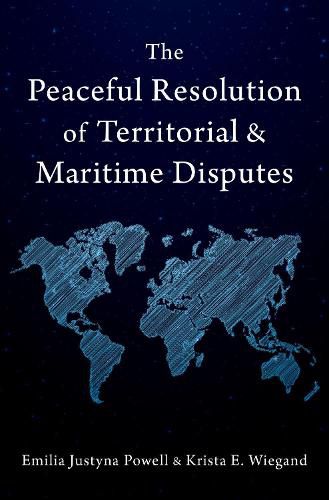Readings Newsletter
Become a Readings Member to make your shopping experience even easier.
Sign in or sign up for free!
You’re not far away from qualifying for FREE standard shipping within Australia
You’ve qualified for FREE standard shipping within Australia
The cart is loading…






This book is about the peaceful resolution (PR) of territorial and maritime disputes and states' strategic behavior vis-a-vis methods of peaceful resolution: bilateral negotiations, good offices, inquiry, conciliation, mediation, arbitration, and adjudication. The authors argue that the high stakes associated with settlement of territorial and maritime disputes, the diversity of PR methods employed, and unpredictability of outcomes push states to strategize. Strategic considerations undergird states' choice of the particular PR methods, and states' behavior during the resolution once a particular method such as adjudication or negotiations, has been initiated. Uncertainty about the outcome drives states to pursue "strategic selection." The process of strategic selection occurs at two interrelated stages: the initial pursuit of a particular method and venue--choice-of-venue strategic selection, and decision-making once a PR method/venue has been identified--within-venue strategic selection. The driving force behind strategizing in these two settlement stages is the hope of reducing uncertainty and of increasing the chances of winning. Importantly, as the disputants progress through the settlement process, states reconsider and refine these strategies.For each stage of strategic selection, Powell and Wiegand identify several mechanisms that influence states' strategies, including past experiences with PR methods (winning/losing), the relationship between domestic law and international law, framing legal claims, and shaping the resolution procedures. This book embraces a multi-method approach and combines statistical analyses and in-depth qualitative interviews with states' legal counsel, judges, arbitrators, government officials, and other experts from multiple countries. The book also highlights numerous real-world instances of territorial and maritime disputes including the Philippines v. China arbitration case in the South China dispute.
$9.00 standard shipping within Australia
FREE standard shipping within Australia for orders over $100.00
Express & International shipping calculated at checkout
This book is about the peaceful resolution (PR) of territorial and maritime disputes and states' strategic behavior vis-a-vis methods of peaceful resolution: bilateral negotiations, good offices, inquiry, conciliation, mediation, arbitration, and adjudication. The authors argue that the high stakes associated with settlement of territorial and maritime disputes, the diversity of PR methods employed, and unpredictability of outcomes push states to strategize. Strategic considerations undergird states' choice of the particular PR methods, and states' behavior during the resolution once a particular method such as adjudication or negotiations, has been initiated. Uncertainty about the outcome drives states to pursue "strategic selection." The process of strategic selection occurs at two interrelated stages: the initial pursuit of a particular method and venue--choice-of-venue strategic selection, and decision-making once a PR method/venue has been identified--within-venue strategic selection. The driving force behind strategizing in these two settlement stages is the hope of reducing uncertainty and of increasing the chances of winning. Importantly, as the disputants progress through the settlement process, states reconsider and refine these strategies.For each stage of strategic selection, Powell and Wiegand identify several mechanisms that influence states' strategies, including past experiences with PR methods (winning/losing), the relationship between domestic law and international law, framing legal claims, and shaping the resolution procedures. This book embraces a multi-method approach and combines statistical analyses and in-depth qualitative interviews with states' legal counsel, judges, arbitrators, government officials, and other experts from multiple countries. The book also highlights numerous real-world instances of territorial and maritime disputes including the Philippines v. China arbitration case in the South China dispute.